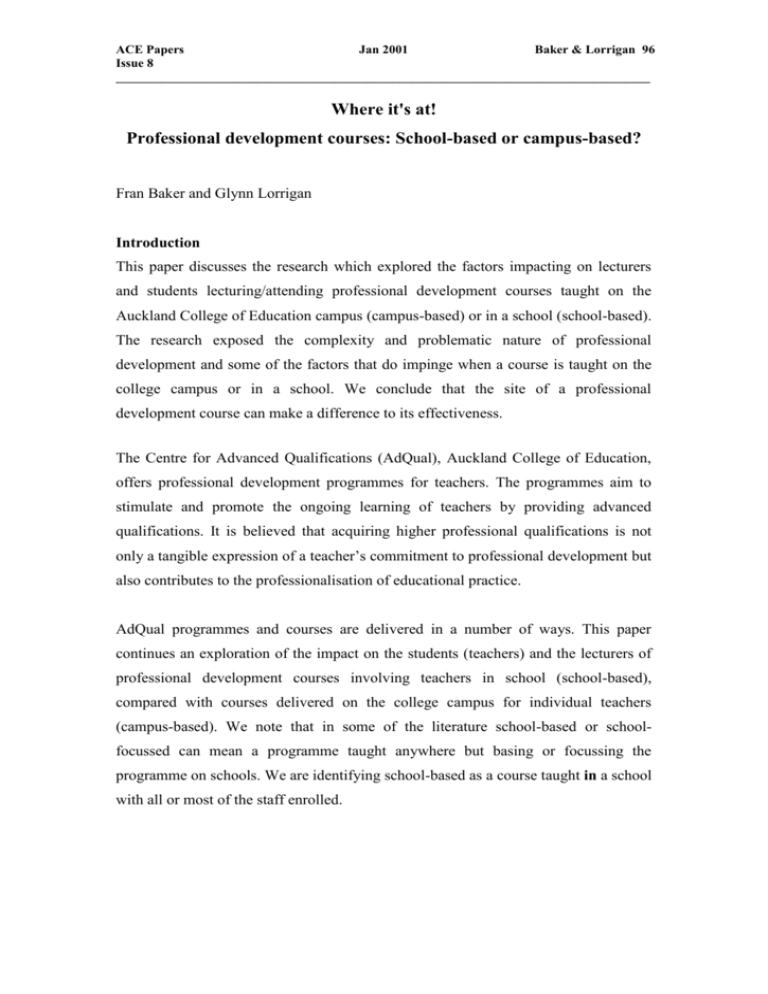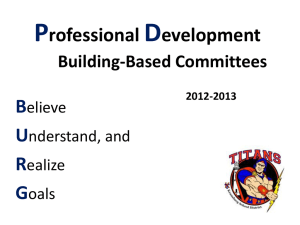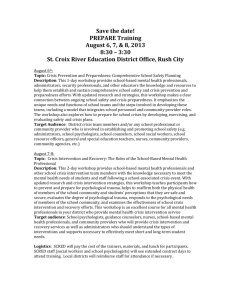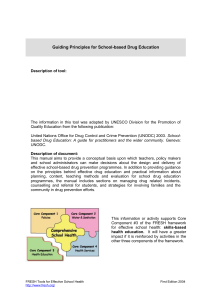Where it's at - The University of Auckland
advertisement

ACE Papers Jan 2001 Baker & Lorrigan 96 Issue 8 ___________________________________________________________________________________ Where it's at! Professional development courses: School-based or campus-based? Fran Baker and Glynn Lorrigan Introduction This paper discusses the research which explored the factors impacting on lecturers and students lecturing/attending professional development courses taught on the Auckland College of Education campus (campus-based) or in a school (school-based). The research exposed the complexity and problematic nature of professional development and some of the factors that do impinge when a course is taught on the college campus or in a school. We conclude that the site of a professional development course can make a difference to its effectiveness. The Centre for Advanced Qualifications (AdQual), Auckland College of Education, offers professional development programmes for teachers. The programmes aim to stimulate and promote the ongoing learning of teachers by providing advanced qualifications. It is believed that acquiring higher professional qualifications is not only a tangible expression of a teacher’s commitment to professional development but also contributes to the professionalisation of educational practice. AdQual programmes and courses are delivered in a number of ways. This paper continues an exploration of the impact on the students (teachers) and the lecturers of professional development courses involving teachers in school (school-based), compared with courses delivered on the college campus for individual teachers (campus-based). We note that in some of the literature school-based or schoolfocussed can mean a programme taught anywhere but basing or focussing the programme on schools. We are identifying school-based as a course taught in a school with all or most of the staff enrolled. 97 Baker & Lorrigan Jan 2001 ACE Papers Issue 8 ____________________________________________________________________________________________ Professional development in New Zealand Schools The New Zealand Education Act of 1989 devolved much responsibility to individual schools with the two major foci being self-management and self-improvement. The responsibility for funding of professional development programmes which was once centralised in a national Department of Education (now defunct), has largely moved to individual schools. The expectations of New Zealand teachers to participate in professional development programmes have also changed. Primary and secondary teachers are now bound by collective employment contracts which state that principals must attest to the competency of each member of staff. Involvement in professional development programmes is often viewed as significant measure of a teachers competency. Many schools identify two separate approaches to professional development within their planning. These are school or whole-staff development and personal development. Sometimes these are seen as being quite separate while in other situations both are viewed as interdependent, with an assumption that the well-being of the school is integrally linked to the learning of the individuals within it. Principles of the Centre’s Professional Development Programmes Staff of the Centre for Advanced Qualifications (AdQual) are conscious of the difficulties in providing successful professional development programmes to teachers. Teacher evaluations of courses have raised awareness of some of the dilemmas that have also been identified by theorists. Fullan (1990: 4) remarks that ‘a great deal of wisdom, skill, and persistence are needed to design and carry out successful development activities.’ Tobin (1988: 483) is in agreement and states that the pathway to successful professional development is, ‘tortuous and a successful journey along it requires patience, perseverance, time, and in many cases a tolerance of failure’. Baird (1988) comments that teachers’ learning may require changes in attitudes, perceptions, conceptions, and beliefs as well as behaviours – a very demanding process. Mindful of this research, the following principles underpin the Centre’s programmes: ACE Papers Jan 2001 Baker & Lorrigan 98 Issue 8 ___________________________________________________________________________________ • an acknowledgement that professional development is a long-term and complex process; • an acknowledgement of the professionalism of teachers; • a consideration of teachers as emotional beings but responsible and active learners; • offering opportunities to build on teachers’ prior knowledge, skills and abilities; • actively involving teachers in critiquing, researching, and reflecting upon their and others’ practice; • offering opportunities for teachers to share and improve their decision-making processes; • allowing chances for informed experimentation and feedback. Concern has been expressed that qualifications for teacher professional development benefit the individual as learner, but not the whole school. Lorrigan (1999) argues that schools are collectives of individual teachers each with their own understandings, knowledge, skills, and a diversity of experiences and ways of applying these in their practice. Teachers bring to any professional development programme their personal characteristics, their histories, their conceptions of self as teacher and as person, their needs (although these may not be expressed), and their perceptions of professional development. All of these will influence the outcome of any professional development programme. The pervasiveness of prior knowledge and experiences reinforces the notion that professional development must acknowledge individual teachers who are growing, learning, and developing (Begg, 1994). Butler (1996) sums this up succinctly when he says professional development is centred radically in self-development. Jarvis, Holford and Griffin (1998: 77) agree and state, ‘Although culture and social context form the context for learning, and strongly influence the processes involved, in a very important sense all learning remains individual. … logically (and psychologically) only individuals can learn’. However, this does not necessarily mean that the individual teachers who study for qualifications do so in isolation without contributing to the development of other teachers, their subject, their school, or to the professionalisation of the practice of teaching. Through learning, understandings may be shared and progress made and as Callender (1992) suggests situations entered as learners can be understood as opportunities for minds to meet and for decisions to follow about common affairs. Teachers who are learners studying for qualifications and who are valued as colleagues in 99 Baker & Lorrigan Jan 2001 ACE Papers Issue 8 ____________________________________________________________________________________________ a collaborative school community may actively contribute to whole-school development. Out of their learning may come informed and knowledgeable interaction – engagement and exchange of ideas, clarification and shared understandings, and a contribution to ‘an organic process of professional renewal’ (Robinson, 1989: 274). A teacher, in evaluating a professional development course for qualification, made this comment emphasising the notion of learning as an opportunity for minds to meet, ‘I have learned from the networking and the opportunities to hear what other schools do. It is great to learn from each other, to mix with primary, secondary and early childhood teachers.’ New Zealand Government initiatives often encourage and fund whole-school development as this has been viewed as the way to promote successful change in education. This view is not one that is shared by researchers (Green, 1998, Robinson, 1989). Bell (1991: 11) states that this approach ‘fails to recognize that the management of change in schools is a complex process which often requires both external and internal support’. Nevertheless the Education Act of 1989 emphasises school improvement and there is a trend for school development programmes to focus on meeting school development objectives. To move from where teachers’ individual professional development needs are acknowledged and supported to where the organisational needs only, are supported. School objectives are often managementinitiated and appear to allow school managers to plan the changes they want in the school they manage with little appreciation of the individual learners who comprise the teaching staff (Hargreaves, 1994). There is much research that shows that coherent and long-term plans for organisational development and improvement are needed. However there is general agreement that the school community should develop these plans. They should link individual teacher’s needs to school needs and provide realistic and differentiated staff development which allows teachers to build on their existing personal and professional strengths and grasp learning opportunities (e.g. Douglas, 1991, Fullan, 1990, Hargreaves, 1994, Hargreaves and Hopkins, 1991, Newton and Tarrant, 1992). [i]f the organization can harmonize the individual’s interests and wishes for personal and career development, with the requirements of the organization as derived from its ACE Papers Jan 2001 Baker & Lorrigan 100 Issue 8 ___________________________________________________________________________________ educational aims, it will improve both individual and organizational performances. The more integrated the two aspects of professional development are the more likely there will be a productive outcome (Bell, 1991: 4). With the responsibility for, and choice of, teacher professional development programmes being held by schools and the New Zealand Government’s encouragement of school-based professional development we became interested in researching the impact of school-based and campus-based courses on the students (teachers) and on the lecturers. We gathered information on this througha) Lecturer interviews An open-ended interview was held with lecturers who had taught a schoolbased course and had taught the same course on the Auckland College of Education campus. b) Teacher-students questionnaire A questionnaire was completed by those teacher-students enrolled in both types of courses. In some cases, particularly school-based courses, this included both teachers and school managers who identified themselves as such. Factors identified as significant by the lecturers There was agreement among the lecturers on the factors they identified as those that significantly impacted on them as lecturers at the different sites. These we categorised as: a) purpose of the professional development course and the effects of this; b) the effects of the learning environment; c) the exchange of ideas and the actioning of these. • Purposes for choosing the mode of delivery and the effects of these In each school the purpose for the school-based courses was clearly identified by the management team to each lecturer. Generally this was because the school management team, or the principal, wanted teachers to be ‘upskilled’It is to get everyone in the school thinking in a certain way… Often they [the management team] is not happy with something and think the paper will help 101 Baker & Lorrigan Jan 2001 ACE Papers Issue 8 ____________________________________________________________________________________________ the school to review things in light of the literature… It seems to have a sort of feeling of imposition about it. … I feel like I have been directed to do this, because the school wants to come out with a certain… and they were quite open about that at the first meeting [T1]. He [the principal] said, well the staff had no choice about this. This is what they have got to do. He wanted everyone on board [T2]. One effect of this was identified by the lecturers when they acknowledged that some students in the school-based courses seemed reticent to speak up, or were even very cynical about the course, its purpose, and its use to them and their practice. Another effect was the wider range of commitment and motivation in the staff on school-based courses compared with the high commitment and motivation of those on campusbased courses. I felt there were greater discrepancies in the range of readiness and engagement within the school-based groups. In the school some teachers appeared to turn off while others appeared reticent…These teachers seldom asked questions. They were often passive in the group and their limited contribution in joint assignments was an issue raised by their colleagues. Such behaviour was not as obvious in the campus-based courses [L]. The effect on the teachers was a certain amount of cynicism, I think. But once they realised that there was a sort of agenda here, and that we wanted them to analyse current practice, critique it and then make some recommendations, some of them didn’t really want to do that. Well, maybe, they wanted to do it but they didn’t want to do it in the way that it was being done… [L2]. They [the teachers] wont even want to have that discussion. They feel so negative about something being imposed upon them. They see it as a taking away from other stuff that they thought was really important. And so they weren’t ready and to me it seemed like a really negative experience for them, even though they admit that there had been things they have learned…[L]. ACE Papers Jan 2001 Baker & Lorrigan 102 Issue 8 ___________________________________________________________________________________ A wider range of abilities, experiences, prior knowledge, was more evident in the school-based teachers–it was like teaching in a very mixed ability classroom which meant my teaching skills were really stretched. Sometimes the ‘politics’ of the school seemed to hinder interaction. Teachers sometimes seemed reluctant to speak out and ‘expose’ themselves and their teaching practice in front of their colleagues…Sometimes it seemed to me that the teachers would have preferred that I lecture at them so they would not have to respond [L2]. In some schools the management team involved the staff in the decision to take part in the course as part of their school-wide professional development programme. However this seemed to be perceived by some staff as still not addressing their particular needs. Even when I thought the school’s management team had gone to considerable efforts to include the staff in the decision to do the course there seemed to be a sort of … reluctance by some teachers … it seemed difficult for them to participate [L2]. The lecturers remarked on some of the effects of school managers participating in the course. According to the lecturer these effects could be positive or negative because some teachers appreciated the principal’s presence but others found it intimidating. An expressed positive view wasDuring the school-based courses the principal and management team were, in every case, part of the course and were studying alongside the teachers. I think this was an important feature of the school-based courses because it signalled the management’s involvement and willingness to learn with their teaching staff. In some schools where management was obviously perceived as separate there were some challenges with involving the principal, in particular, in-group work. In one school the principal worked alone and in another a deputy principal had quite a difficult time fitting into a group and in fact influenced its productivity to such an extent that the assignment deadline was not met. 103 Baker & Lorrigan Jan 2001 ACE Papers Issue 8 ____________________________________________________________________________________________ In schools where the principal and management team had developed an inclusive relationship with staff … where there appeared to be a learning culture … management involvement was readily accommodated. Several teachers mentioned in their evaluations of the course how valuable an experience it was to work in group-learning situations with the management. One principal made a special point of acknowledging the hard work and commitment of her teachers which she had experienced intimately through the course process. However, in every school some tension existed… especially when topics challenging systems and processes were raised. The relationship between management and teaching staff was crucial in how successful such challenges were identified, discussed and resolved [L1]. It was very difficult for the teachers to speak up and I think a lot of those issues of process when teachers who will come into a course here [ACE] and very openly speak about their school setting and what’s right and what’s wrong … gives them the opportunity to really thrash out where their school is at and get a feel, at the end of the course, what their school does and where it is in terms of practice as opposed to a whole range of schools across Auckland. But in this [a school] setting there isn't and you feel that it’s not as dynamic. I feel that the discussion, the ideas that came forward, that the questioning was not as dynamic as it is here [at ACE] [L2]. One of the team expressed a concern that someone from management was in their team, they were worried about that. They didn’t actually see it as negative but they were worried about it…Discussions were probably less open on the whole [L3]. • The effects of the learning environment The learning environment was found to be influential on both the lecturers and the students. The campus-based courses are held in a lecture room which contributes to the formality of the course. The neutrality of this environment appeared to remove not only some of the troublesome physical factors, for example, size of room and chairs, ACE Papers Jan 2001 Baker & Lorrigan 104 Issue 8 ___________________________________________________________________________________ deficiencies of equipment, presence of teachers’ children, interruptions by demanding parents, but some personal factors also. Also in comparison staffrooms were perceived by teachers as places to relax and lecturers wanted the teachers to work! Lecturers sometimes asked to have the course out of the staffroom and a suitable room was often difficult to find. Taking their own resources each time and physically ferrying these around the school was also a difficulty for lecturers. The number of interruptions and the challenges of keeping everyone on task were markedly more pronounced in school-based courses. The school environment kept impacting on my work in the school. The environment and the perceived informality of the course also affected attendance and punctuality. Often the principal or some member of the management team was delayed while other teachers were occupied with parents, children who had not been collected from the school, or after school crossing duty. Often school-based teachers slumped into chairs sapped of energy and desperate for a hot drink. I had to plan some very interesting beginning activity to draw their energy together and get focussed on the topic. Of course the campus teachers were also tired but once they arrived at the lecture room they seemed more able to focus quickly on the task, and the interruptions from the outside world were very few. The school-based teachers come directly from the classroom to the venue, usually the staffroom. Not only do they bring all the everyday classroom ‘stuff’ with them, but they often see the staffroom as a place of rest and relaxation and then to ask them to sit and read and reflect is almost too much! Scaffolding to get teachers interested and engaged, seems to be more crucial in school-based courses.… It would seem that when teachers come into a campus-based course their expectations are of a formal course. I felt that the teachers behaved as if they were coming to a class, there appeared to be more of a degree of rigour and academia about these courses. Teachers usually came prepared, having critiqued the required readings and thought about the links to their practice. They were also more likely to have accessed the library and sourced additional materials [L3]. 105 Baker & Lorrigan Jan 2001 ACE Papers Issue 8 ____________________________________________________________________________________________ I really wanted to move them to a neutral setting, where it wasn’t a socialising setting so we moved to the library and I had real problems setting up resources…I had to carry all the resources and every week there was probably a moment when I thought if I was near my office I could have whipped back and got that or passed this book on… [L2]. So the one on the campus is largely neutral. People come in with all their stuff from their school but they are coming to a situation where it can be talked about and sort of left there… but the culture of the school really does impact on the course, it definitely does [L1]. The environment also affected the lecturer’s approach to the group of learnersIt’s like they all are part of a team, they are used to each other, they are very familiar with the school and with one another. They have built up a culture so instead of being able to be in a fairly neutral culture where people come to me, I am actually going into something that is fairly strongly established. So I have to suss out and have some savvy about what will work here and what wont work here [L1]. …you walk into the school and you’re in somebody else’s space, you’re there as a guest and I felt that very much.… There were rules for behaviour that you needed to go along with, or you needed to know about [L2]. • Exchange of ideas and the actioning of these The lecturers remarked on the differences the sites seem to offer in the opportunities to exchange ideas between the two groups. …I felt that here [ACE] you get a lot more questioning and lively discussion and issues raised where people don’t feel personally confronted. But in that setting I could sense there was a lot of looking before you spoke, a lot of seeing people’s responses, a lot of raised eyebrows when people said things and thinking, ‘have I stepped on somebody’s toes?’ [L2]. ACE Papers Jan 2001 Baker & Lorrigan 106 Issue 8 ___________________________________________________________________________________ On campus there can be a wide range of teachers from across sectors, group formation is easier as working relationships have not been formed, and so you can have a wide variety of experiences, ideas, and opinions that are shared. Many campus-based teachers make positive statements about the opportunities to network with other teachers, to hear what is happening in other schools, and to have their understandings expanded. This was viewed as an important part of their professional development [L1]. I think that the cross pollination of ideas was really lacking [in the school site] and I actually needed to keep bringing in examples of what happens in other schools and it surprised me that they didn’t know a lot about other schools [L3]. Lecturers had assumed that discussions would take place amongst all the teachers in school-based courses, but sometimes discovered that the exchange of ideas about the course was not always easy. However those staff with expertise were sometimes ‘discovered’. An interesting phenomenon in some school-based courses is the reluctance of syndicates or working teams to separate and reform so that cross-pollination of ideas can occur. I often had to work hard to ensure group composition was different from the school working teams. This seemed to be because of school structures and teachers’ friendship bonds within teams, and a perception that other staff would have little understanding of their particular issues at their particular level. School-based courses can however help to identify expertise and areas of understanding and knowledge of individual teachers leading to their empowerment within the school. When mixed groups were formed in one school, staff were surprised and delighted to discover the hidden knowledge of one quiet colleague. Mixed groups enabled him to share his expertise more widely and for this to be acknowledged by his colleagues [L1]. 107 Baker & Lorrigan Jan 2001 ACE Papers Issue 8 ____________________________________________________________________________________________ Feed back to colleagues in schools often produced excitement and even competition between the groups presentingIn both situations seminar presentations were viewed with some trepidation, however, the school-based courses built the seminar into a major production accompanied by much nervous excitement and culminating in stunning, almost theatrical presentations. Several groups performed original rhymes or songs, others role-played, some produced videos, there was even a rap, and the quality of props and handouts was often superb. The audience was receptive and enthusiastic and often included the wider community. There was a sense of celebration. In contrast the campus-based teachers’ presentations were usually rather formal and sober affairs accompanied by dozens of beautifully prepared overhead transparencies. The audience of colleagues was supportive and encouraging but the atmosphere was definitely one of studious intent [L2]. The lecturers did comment, however, that they felt that school-based courses had more of a potential to provide the staff with opportunities to critically look at their policies and practices and, as a consequence, to recommend and sometimes implement changes. I think if you can create an environment where they feel safe to say what they really think and you can build in a critique of current policy you can move the process of change along, I think, in a real way. Whereas one teacher coming in to a campus course would find this more difficult [L3]. However, most of the campus-based teachers remarked on how difficult it was to maintain their enthusiasm in the face of day-to-day life in the school. They’d get all fired up after class but found everyone was ‘too busy’ and things tended to fizzle out [L4]. Teacher-student views Teacher-student responses to the questionnaire indicate some differences between the two modes of delivery. The data gathered supported many of the statements made by the lecturers and the student questionnaire responses were categorised in the same way as the lecturer interviews. ACE Papers Jan 2001 Baker & Lorrigan 108 Issue 8 ___________________________________________________________________________________ • Purposes for choosing the mode of delivery and the effects of these School-based courses were perceived as a “compulsory requirement” set by management 83% of the school-based students (SBs) noted that their major reason for enrolling in the paper was a strong suggestion from school management. No campus-based students (CBs) noted this as a major reason for enrolling. 26% of SBs said they wanted to increase their skills whereas 75% of CBs stated that this was the major reason for enrolling. We believe that student-willingness and/or readiness are most significant factors in effective professional development. The effects are noted in the following 92% CBs (but only 30% SBs) said their understandings as a result of participation in the paper had changed markedly. 77% CBs (but only 9% SBs) recorded that their teaching practice had changed markedly as a result of attending the course. However 74% of SBs did admit to a ‘little change’ in practice. • The effects of the learning environment and the exchange of ideas and the actioning of these A surprising outcome for the researchers was the lack of any marked differences noted by the SBs and CBs when commenting on many aspects of the learning environment and the effects of this. Questionnaire responses showed that differences between the 2 modes appeared to be insignificant in school management support, in time to trial new approaches in school, and in the follow-up discussions in school. However one difference was noted when 89% of CBs stated that the course helped to increase their confidence whereas only 52% of SBs stated that this was so. Time to reflect on their practice appeared also to be something that more CBs commented favourably upon, 77% saying that they had the time compared with 52% of SBs. Questionnaire responses about the exchange of ideas and the actioning of these also proved surprising. 109 Baker & Lorrigan Jan 2001 ACE Papers Issue 8 ____________________________________________________________________________________________ Although 70% of the SBs commented that they had support from other class members 89% of CBs recorded that this was so. 78% of SBs said they felt motivated to trial new approaches but 100% of CBs recorded that they felt motivated to trial new approaches. Implications Much is written about models and processes of teacher professional development but there is scant New Zealand research that comments on the factor of site. We feel that the current push by the New Zealand Government for school-based professional development programmes and courses without the necessary research into its benefits or challenges is a concern. Professional development is a highly complex activity and the context, and site, as our research shows, are significant factors for the lecturers and the students involved. The lecturers interviewed had strong feelings about the problematic nature of school-based professional development – So for me personally it challenged me every week to stand in front of them as a cohesive group on their territory… to connect with them to break down the barriers, and to try and bring in theory and research [L2]. I think it starts off as being quite a difficult and challenging situation, it is certainly, certainly ten times, a hundred times more challenging than a campus-based course [L1]. We agree with the lecturer who statedProfessional development is looking at long-term change in individuals … it is an individual thing and it has to be something that the individual is engaged in and is actively motivated to do. Because I think and I know from my reading about it, that it takes time for teachers to change their practice, their beliefs, to build on their understandings, to trial different ways of working … to change their practice. They wont do that unless they are supported and encouraged. I think they need to see the benefits of the change for themselves [L1]. The campus-based students appeared to be able to increase their understandings and make changes to their teaching practice, reflect on their practice and become more ACE Papers Jan 2001 Baker & Lorrigan 110 Issue 8 ___________________________________________________________________________________ confident teachers, more readily than those in the schools. If effective and meaningful professional development programmes are to be delivered in schools then many factors need to be considered and school management needs to be aware of them. This research highlights the following factors as significant to the effectiveness of the courses: • the purpose of the professional development including the participation of school management; • the effects of the learning environment; • the culture of the school including opportunities to exchange ideas and the actioning of these; • the willingness/readiness of students (teachers) to be involved in professional development i.e. as actively engaged and responsive learners. Conclusion Professional development is a complex process which stimulates and promotes the ongoing learning of teachers. This research indicates that the site of professional development courses is a significant factor. For effective professional development, issues related to site need to be addressed before courses are taught. This research demonstrates that a commitment from those involved is a crucial factor in effective professional development. In school-based programmes management’s role in selecting the course and their expectations of their staff need to be overt and carefully considered, as does an awareness of the effects of the learning environment. Likewise a school culture which includes not only the opportunities to exchange ideas but also to action them. However the effects of the participation of management, in professional development courses, must also be heeded by those selecting and implementing the courses. Comments welcome f.baker@ace.ac.nz g.lorringan@ace.ac.nz References Baird, J. (1988). Teachers in science education. In P. Fensham (Ed) Development and dilemmas in science education (pp. 55-72). New York: The Falmer Press. 111 Baker & Lorrigan Jan 2001 ACE Papers Issue 8 ____________________________________________________________________________________________ Begg, A. (1994). Professional development of high school mathematics teachers. Unpublished doctoral thesis, University of Waikato, Hamilton. Bell, L. (1991). Approaches to the professional development of teachers. In L. Bell & C. Day (Eds.), Managing the professional development of teachers (pp. 3-22). Milton Keys: Open University Press. Butler, J. (1996). Professional development: Practice as text, reflection as process, and self as locus. Australian Journal of Education, 40(3), 265-283. Callender, W. (1992). Adult education as self education. Adult Education Quarterly, 42(3), 149-163. Douglas, B. (1991). 'Teachers as experts': A case study of school-based staff development. In L. Bell & C. Day (Eds.), Managing the professional development of teachers (pp. 3-22). Milton Keys: Open University Press. Fullan, M. (1990). Staff development, innovation, and institutional development. In B. Joyce (Ed.), Changing school culture through staff development (pp. 3-25). Alexandria: Association for Supervision and Curriculum Development. Green, J. (1998). Teacher professionalism, teacher development and school improvement. In R. Halsall (Ed.) Teacher research and school improvement (pp. 200-210). Buckingham: Open University Press. Hargreaves, A. (1994). Restructuring restructuring: Postmodernity and the prospects for educational change. Journal of Education Policy, 9(1), 47-65. Hargreaves, D. & Hopkins, D. (1991). The empowered school. London: Cassell. Jarvis, P., Holford, J. & Griffin, C. (1998). The theory and practice of learning . London: Kogan Page. Lorrigan, G. (1999). Practising professional development: Plans, principles and problems. Paper Presented at Third International Conference on Teacher Education. Israel New Zealand Education Institute Te Riu Roa (1998). Primary Teachers, Deputy Principals, and other Unit Holders Collective Employment Contract 1998–2000. Wellington: New Zealand Education Institute Te Riu Roa. Newton, C. & Tarrant, T. (1992). Managing change in schools. London: Routledge. Robinson, I. (1989). The empowerment paradigm for the professional development of teachers of mathematics. In N. Ellerton & M. A. Clements (Eds.), School mathematics: The challenge to change. Geelong: Deakin University. Tobin, K. (1988). Improving science teaching practices. Journal of Science Education, 10, 475-484.






